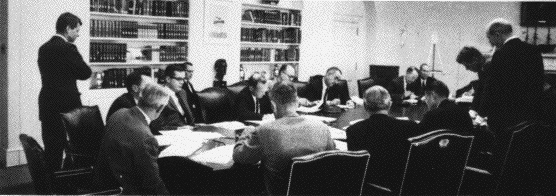
The most critical and dangerous event in the Nuclear Era: the Cuban missile crisis, 1962.
How to reconcile new information coming out of the Soviet Union, Cuba, and the inner sanctums of the U S. Government? How
to locate the thousands of classified documents spread across the globe, many never before released, in order to piece
together a comprehensive and balanced record of the crisis?
The National Security Archive is a non-profit research institute and library based in Washington, D.C. The Archive has for
several years been diligently locating, obtaining declassification of, organizing, and indexing government documents on the
Cuban missile crisis as part of its commitment to capture the documentary record of the critical events, issues, and decisions
of the Nuclear Age, along with other contemporary defense, intelligence, and foreign-policy subjects.
Through comprehensive research at the John F Kennedy Library and dozens of other archival facilities, sophisticated use of the Freedom of Information Act, cultivation of an extensive network of government, media, and academic contacts, and computer-based cataloging, the Archive has developed an unmatchable collection of primary materials--comprehensive in scope, pioneering in organization, startling in content.
Now through a cooperative publishing program with Chadwyck-Healey, this resource, becomes available in fully-indexed form to researchers everywhere.
The Cuban Missile Crisis, 1962reproduces on microfiche over 15,000 pages of rarely-seen documents from the highest
levels of government. In many cases, these materials have been gathered by the National Security Archive through its own--or
other researchers'--Freedom of Information Act requests.
The collection presents a uniquely integrated, comprehensive history of the crisis, covering the aftermath of the Bay of Pigs; the U.S. secret war against Castro; the first intelligence reports which pointed to the deployment of Soviet missiles in Cuba; the intense crisis management and decision-making process in Washington; the military's enforcement of a naval blockade of Cuba and its preparations for a massive invasion; and the agreements reached by John Kennedy and Nikita Khrushchev that pulled their nations back from the brink of war.
Documents include:
It would take an individual researcher years of work, along with an overwhelming financial commitment, to accumulate
the resources offered in this collection. Here is a one-stop retrieval for information on events, issues, and players.
The core of the collection is comprised of documents from the Department of State, the White House, and the main decision-making body during the crisis: the National Security Council's "Executive Committee" known as the "ExComm." Important additional material comes from:
Central Intelligence Agency
Department of Defense
Joint Chiefs of Staff
Federal Bureau of Investigation
U.S. Marine Corps, Army, Navy, and Air Force
Papers of U.S. Officials
Defense Intelligence Agency
United Nations
Organization of American States
In-depth, document-level indexing gives users an ease and precision of access that is rare for any published manuscript
collection, government or non-government. Important transactions within each document are indexed individually. Prepared
by the Archive staff, the hard-bound index to names and subjects--designed by indexing specialist David Bearman--is
a major historical contribution in itself.
Also provided are:
Events chronology
Glossaries of key individuals and organizations
Chronological document bibliography
Bibliography of relevant secondary sources
Through its documentary breakthroughs and unparalleled access tools, the Cuban Missile Crisis, 1962 allows scholar and student alike to gain remarkable new insights into the premier case study in political decision-making and crisis management.
With its documentary richness and balance of perspectives,the collection opens important research vistas:
This is a sampling of the more than 3500 documents included in The Cuban Missile Crisis, 1962:
Materials were identified, obtained, assembled, and indexed by the National Security Archive, a non-profit research institute and library located in Washington, D.C.
Documents are arranged in a general chronological order. Each document bears a unique accession number, to which all indexing is keyed.
Volume II contains an events chronology, glossaries of names and organizations, a chronological document bibliography, and a bibliography of secondary sources.
The Editorial Board of The Cuban Missile Crisis, 1962 reflects the collaborative effort of those who were engaged in the decision-making sessions of the Executive Committee of the National Security Council (ExComm) with preeminent scholars of the crisis.
National Security Archive Project Editors
Praise for The Cuban Missile Crisis, 1962
"A magnificent achievement. . . The National Security Archive has the essential empirical grounding necessary for the further
study of the crisis. It is inconceivable that any serious student of the crisis, the nuclear age, the Kennedy Administration, or
US.-Soviet relations in the post-war era would begin a study without the benefit of the Archive's work in the Cuban missile crisis."
James Blight
Harvard University
Co-author, "On the Brink: Americans and Soviets
Reexamine the Cuban Missile Crisis"